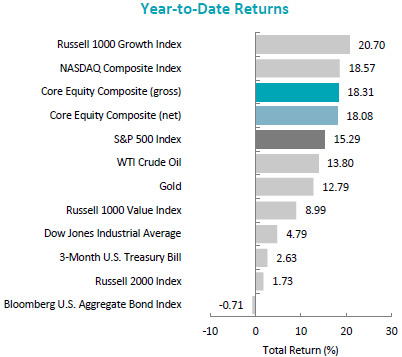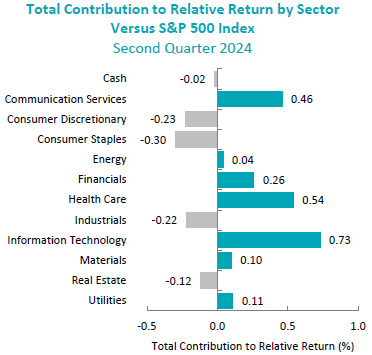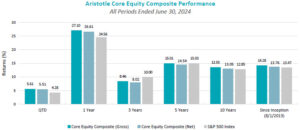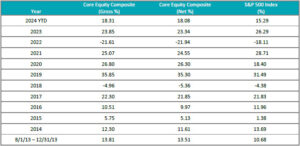Commentary
Core Equity 2Q 2024
Markets Review
The U.S. equity market achieved record highs, as the S&P 500 Index rose 4.28% during the period. Gains were once again driven by the “Magnificent 7.” This narrow group of stocks was responsible for the majority of the S&P 500’s return during the quarter. Concurrently, the Bloomberg U.S. Aggregate Bond Index returned 0.07% for the quarter. In terms of style, the Russell 1000 Value Index underperformed its growth counterpart by 10.50%.
On a sector basis gains were made from five of the eleven sectors within the S&P 500 index led by Information Technology and Communication Services. The worst performing sectors were Materials and Industrials.

Sources: CAPS CompositeHubTM, Bloomberg
Past performance is not indicative of future results. Aristotle Atlantic Core Equity Composite returns are presented gross and net of investment advisory fees and include the reinvestment of all income. Gross returns will be reduced by fees and other expenses that may be incurred in the management of the account. Net returns are presented net of actual investment advisory fees and after the deduction of all trading expenses. Aristotle Atlantic Composite returns are preliminary pending final account reconciliation. Please see important disclosures at the end of this document.
Data released during the period showed that U.S. economic growth slowed to an annual rate of 1.4% in the first quarter from 3.4% in the last quarter of 2023, as consumer spending, exports and government spending decelerated. Meanwhile, CPI inflation rose at an annual rate of 3.4% in April and 3.3% in May. This combination of sluggish economic growth and persistent inflation raised concerns about potential stagflation. However, the U.S. labor market remained strong, with unemployment at 4.0%, and consumer spending continued to grow.
Due to the unchanged macroeconomic landscape, with elevated inflation and a healthy labor market, the Federal Reserve (Fed) maintained the benchmark federal funds rate’s targeted range of 5.25% to 5.50% and continued reducing its holdings of Treasury securities. Fed Chair Powell emphasized patience in monetary policy changes and indicated it may take longer than expected to lower rates, as the committee is seeking greater confidence that inflation is sustainably moving toward its 2% target.
Corporate earnings were strong, with S&P 500 companies reporting earnings growth of 6.0% and more companies exceeding EPS estimates compared to the previous quarter. Despite slowing economic growth, fewer companies discussed the potential for a recession on earnings calls, and fewer companies mentioned inflation.
In geopolitics, tensions remained high as President Biden hiked tariffs on $18 billion of imports from China in a bid to protect U.S. workers and businesses. In the Middle East, the U.S. continued efforts to stabilize maritime traffic in the Red Sea while also facing criticism from Israeli Prime Minister Netanyahu, who claimed the U.S. was withholding weapons from Israel. The U.S. presidential campaign season also began in earnest, with the first debate between incumbent Joe Biden and Republican rival Donald Trump taking place in June.
Performance and Attribution Summary
For the second quarter of 2024, Aristotle Atlantic’s Core Equity Composite posted a total return of 5.61% gross of fees (5.51% net of fees), outperforming the S&P 500 Index, which recorded a total return of 4.28%.
| Performance (%) | 2Q24 | 1 Year | 3 Years | 5 Years | 10 Years | Since Inception* |
|---|---|---|---|---|---|---|
| Core Equity Composite (gross) | 5.61 | 27.10 | 8.46 | 15.01 | 13.55 | 14.28 |
| Core Equity Composite (net) | 5.51 | 26.61 | 8.02 | 14.54 | 13.05 | 13.76 |
| S&P 500 Index | 4.28 | 24.56 | 10.00 | 15.03 | 12.85 | 13.47 |

Source: FactSet
Past performance is not indicative of future results. Attribution results are based on sector returns which are gross of investment advisory fees. Attribution is based on performance that is gross of investment advisory fees and includes the reinvestment of income. Please see important disclosures at the end of this document.
During the second quarter, the portfolio’s outperformance relative to the S&P 500 Index was primarily due to security selection. Security selection in Information Technology and Health Care contributed the most to relative performance. Conversely, security selection in Consumer Staples and Consumer Discretionary detracted from relative performance.
Contributors and Detractors for 2Q 2024
| Relative Contributors | Relative Detractors |
|---|---|
| Nvidia | Darling Ingredients |
| Alphabet | Norfolk Southern |
| Broadcom | Halliburton |
| Guardant Health | AMETEK |
| Costco Wholesale | Estée Lauder |
Contributors
Nvidia
Nvidia contributed to portfolio performance in the second quarter as investors continued to view positively the new product roadmap for the rest of the year. The company sees accelerating demand for its GPU semiconductors from hyperscalers and enterprises. Nvidia’s GPU semiconductors continue to be the industry-leading building blocks of the accelerated computing data center architecture to drive AI compute and applications.
Alphabet
Alphabet contributed to portfolio performance in the second quarter, boosted by a strong earnings report featuring better-than-expected revenues across all businesses. The company’s positive commentary on the long-term monetization of its AI investments, dividend initiation and increase in its share buyback program contributed to the strong performance. Additionally, evidence increasingly suggests that competitors’ GenAI use cases have not disrupted Alphabet’s search business, allowing the company to maintain its market leadership and attract incremental advertising dollars.
Detractors
Darling Ingredients
Darling Ingredients detracted from portfolio performance in the quarter, as shares continued to be weak following an in-line quarterly earnings report where the company provided initial 2024 EBITDA guidance of $1.3B to $1.4B, below consensus estimates. On a positive note, the company called out improving fat prices exiting the first quarter. Additionally, in its renewable diesel joint venture, the company has worked through higher-cost feedstocks contracted during start-up, so renewable diesel margins should improve on the lower input prices. We believe there are several catalysts for Darling going forward, including the blenders tax credit transitioning to a producer’s tax credit on January 1, 2025 and positive commentary around contracting sustainable aviation fuel (SAF) at a $1-$2 per gallon premium to renewable diesel. SAF production starts were pulled forward to the fourth quarter from prior guidance of early 2025.
Norfolk Southern
Norfolk Southern detracted from performance in the second quarter. The company reported a worse-than-expected earnings result for its first quarter in late April. In the second quarter, the company has been reporting weaker-than-expected railcar volumes on its network. This weaker volume has resulted in some sell-side analysts reducing their estimates for the second quarter of 2024. In addition, sentiment is weak because an activist shareholder was not successful in replacing the CEO of Norfolk Southern during a proxy battle in May; however, the activist did succeed in replacing some board members.
Recent Portfolio Activity
The table below shows all buys and sells completed during the quarter.
| Buys | Sells |
|---|---|
| Amphenol | Abbott Laboratories |
| Boston Scientific | Accenture |
| Microchip Technology | Teleflex |
Buys
Amphenol
Amphenol is one of the world’s largest designers, manufacturers and marketers of electrical, electronic and fiber optic connectors and interconnect systems; antennas; sensors and sensor-based products; and coaxial and high-speed specialty cable. The company estimates, based on recent reports of industry analysts, that worldwide sales of interconnect and sensor-related products were approximately $235 billion in 2023. The company aligns its businesses into three reportable business segments: Harsh Environment Solutions, Communications Solutions, and Interconnect and Sensor Systems. The company sells products to customers in a diversified set of end markets.
We see Amphenol benefiting from increased spending by cloud service providers, hyperscalers and enterprises on new data center architectures that enable AI computing technologies. The increased interconnect content that AI-enabled data centers require, we believe, will underpin a double-digit sales growth outlook for the company over the next few years. The company has attractive end-market diversification, with exposure to both short-cycle and long-cycle, and no single end market vertical represents more than 25% of revenues. Additionally, Amphenol has strong free cash flow generation, which has supported a successful M&A strategy that has driven enhanced advancement.
Boston Scientific
Boston Scientific is a global developer, manufacturer and marketer of medical devices that are used in a broad range of interventional medical specialties. The company develops cardiovascular and cardiac rhythm management products, including imaging catheters, imaging systems and guidewires. It also makes devices used for electrophysiology, endoscopy, pain management (neuromodulation), urology and pelvic health, including laser systems, hydrogel systems and brain stimulation systems. Boston Scientific markets its products in about 130 countries; the U.S. generates about 60% of revenue.
We believe Boston Scientific, as a leader in medical devices, is benefiting from the strong utilization trends coming out of COVID, positive demographic trends with aging patients, and new product innovation to gain market share. The company has executed well against the long-range plan issued last fall, which calls for organic sales growth in the range of 8%-10%, 150 basis points of operating margin expansion and category leadership over the period 2024 through 2026. Additionally, we see a consistent track record of accelerating organic sales growth and a track record of accretive M&A.
Microchip Technology
Microchip develops, manufactures and sells smart, connected and secure embedded control solutions used by its customers for a wide variety of applications. With over 30 years of technology leadership, Microchip’s broad product portfolio is a Total System Solution for its customers that can provide a large portion of the silicon requirements in their applications. Total System Solution is a combination of hardware, software and services that helps customers increase their revenue, reduce their costs and manage their risks compared to other solutions. Microchip’s synergistic product portfolio empowers disruptive growth trends, including 5G, data centers, sustainability, Internet of Things and edge computing, advanced driver assist systems and autonomous driving, and electric vehicles in key end markets such as automotive, aerospace and defense, communications, consumer appliances, data centers and computing, and industrial.
We believe Microchip’s Total System Solution will continue to support industry share gains and margin expansion as end-market demand for industrial and Internet of Things compute needs begins to recover off current lows. Management has accelerated the drawdown of high customer inventory levels by shutting down manufacturing facilities, and current industry data as well as commentary from peers indicates that overall end demand is seeing early signs of improvement. The company has a demonstrated track record of margin expansion, and we expect to see gross margins trough at the current level and, through internal efficiencies and pricing initiatives for its Total System Solution, expand and drive increasing operating margins and higher levels of free cash flow.
Sells
Abbott Laboratories
We sold Abbott Laboratories given the full valuation and the complexity of its combined businesses. While we like the company’s continuous glucose monitoring business FreeStyle Libre and its aggregate medical device business, we are less excited about the prospects for its nutritional business and established pharmaceuticals business. Recent news of a large jury award at an infant formula competitor has us concerned that the overhang of this litigation could be an ongoing negative for Abbott for some time.
Accenture
We sold Accenture and see more limited upside for Accenture due to continuing trends of more selective IT budget spend and a reallocation of IT budgets to support AI initiatives. We believe growth rates for IT services will be lower over the next few years as enterprises continue to digest spending from the pandemic and focus on more cost-benefit analysis for IT initiatives, leading to longer sales cycles and more targeted projects.
Teleflex
We sold Teleflex given its below-peer revenue growth rates and seeming lack of participation in the broader pickup in health care utilization. Teleflex has struggled with recent acquisitions underperforming expectations, and the expected recovery in UroLift volumes remains elusive.
Outlook
The equity markets in the second quarter posted positive returns, led by the broadening secular trend in AI. The move in interest rates was muted in the quarter as markets await a clear signal from the Federal Reserve on the timing of a rate reduction. On the margin, economic activity slowed, with multiple ISM manufacturing readings in contraction territory and a weakening housing market. Equity valuations remain high, with AI-focused companies contributing the most to these elevated levels. The geopolitical situation remains very unsettled, and a U.S. presidential election moves into focus, adding to the level of uncertainty. With many issues unresolved, we could see markets move into a period of higher volatility off very low levels. The equity markets continue to reflect the positive backdrop of growing earnings and a potential lowering of interest rates. Our focus will continue to be at the company level, with an emphasis on seeking to invest in companies with secular tailwinds or strong product-driven cycles.
The opinions expressed herein are those of Aristotle Atlantic Partners, LLC (Aristotle Atlantic) and are subject to change without notice. Past performance is not a guarantee or indicator of future results. This material is not financial advice or an offer to purchase or sell any product. You should not assume that any of the securities transactions, sectors or holdings discussed in this report were or will be profitable, or that recommendations Aristotle Atlantic makes in the future will be profitable or equal the performance of the securities listed in this report. The portfolio characteristics shown relate to the Aristotle Atlantic Core Equity strategy. Not every client’s account will have these characteristics. Aristotle Atlantic reserves the right to modify its current investment strategies and techniques based on changing market dynamics or client needs. There is no assurance that any securities discussed herein will remain in an account’s portfolio at the time you receive this report or that securities sold have not been repurchased. The securities discussed may not represent an account’s entire portfolio and, in the aggregate, may represent only a small percentage of an account’s portfolio holdings. The performance attribution presented is of a representative account from Aristotle Atlantic’s Core Equity Composite. The representative account is a discretionary client account which was chosen to most closely reflect the investment style of the strategy. The criteria used for representative account selection is based on the account’s period of time under management and its similarity of holdings in relation to the strategy. Recommendations made in the last 12 months are available upon request.
Returns are presented gross and net of investment advisory fees and include the reinvestment of all income. Gross returns will be reduced by fees and other expenses that may be incurred in the management of the account. Net returns are presented net of actual investment advisory fees and after the deduction of all trading expenses.
All investments carry a certain degree of risk, including the possible loss of principal. Investments are also subject to political, market, currency and regulatory risks or economic developments. International investments involve special risks that may in particular cause a loss in principal, including currency fluctuation, lower liquidity, different accounting methods and economic and political systems, and higher transaction costs. These risks typically are greater in emerging markets. Securities of small‐ and medium‐sized companies tend to have a shorter history of operations, be more volatile and less liquid. Value stocks can perform differently from the market as a whole and other types of stocks.
The material is provided for informational and/or educational purposes only and is not intended to be and should not be construed as investment, legal or tax advice and/or a legal opinion. Investors should consult their financial and tax adviser before making investments. The opinions referenced are as of the date of publication, may be modified due to changes in the market or economic conditions, and may not necessarily come to pass. Information and data presented has been developed internally and/or obtained from sources believed to be reliable. Aristotle Atlantic does not guarantee the accuracy, adequacy or completeness of such information.
Aristotle Atlantic Partners, LLC is an independent registered investment adviser under the Advisers Act of 1940, as amended. Registration does not imply a certain level of skill or training. More information about Aristotle Atlantic, including our investment strategies, fees and objectives, can be found in our Form ADV Part 2, which is available upon request. AAP-2407-13


Sources: CAPS Composite Hub, Russell Investments
Composite returns for all periods ended June 30, 2024 are preliminary pending final account reconciliation.
The Aristotle Core Equity Composite has an inception date of August 1, 2013 at a predecessor firm. During this time, Mr. Fitzpatrick had primary responsibility for managing the strategy. Performance starting November 1, 2016 was achieved at Aristotle Atlantic.
Past performance is not indicative of future results. Performance results for periods greater than one year have been annualized. Returns are presented gross and net of investment advisory fees and include the reinvestment of all income. Gross returns will be reduced by fees and other expenses that may be incurred in the management of the account. Net returns are presented net of actual investment advisory fees and after the deduction of all trading expenses.
The Russell 1000® Growth Index measures the performance of the large cap growth segment of the U.S. equity universe. It includes those Russell 1000 companies with higher price-to-book ratios and higher forecasted growth values. This index has been selected as the benchmark and is used for comparison purposes only. The Russell 1000® Value Index measures the performance of the large cap value segment of the U.S. equity universe. It includes those Russell 1000 companies with lower price-to-book ratios and lower expected growth values. The S&P 500® Index is the Standard & Poor’s Composite Index of 500 stocks and is a widely recognized, unmanaged index of common stock prices. The Dow Jones Industrial Average® is a price-weighted measure of 30 U.S. blue-chip companies. The Index covers all industries except transportation and utilities. The NASDAQ Composite Index measures all NASDAQ domestic and international based common type stocks listed on The NASDAQ Stock Market. The NASDAQ Composite includes over 3,000 companies, more than most other stock market indices. The Bloomberg U.S. Aggregate Bond Index is an unmanaged index of domestic investment grade bonds, including corporate, government and mortgage-backed securities. The WTI Crude Oil Index is a major trading classification of sweet light crude oil that serves as a major benchmark price for oil consumed in the United States. The Russell 2000® Index measures the performance of the small cap segment of the U.S. equity universe. The Russell 2000 Index is a subset of the Russell 3000® Index representing approximately 10% of the total market capitalization of that index. It includes approximately 2000 of the smallest securities based on a combination of their market cap and current index membership. The 3-Month U.S. Treasury Bill is a short-term debt obligation backed by the U.S. Treasury Department with a maturity of three months. The Consumer Price Index (CPI) is a measure of the average change over time in the prices paid by urban consumers for a market basket of consumer goods and services. While stock selection is not governed by quantitative rules, a stock typically is added only if the company has an excellent reputation, demonstrates sustained growth and is of interest to a large number of investors. The volatility (beta) of the Composite may be greater or less than its respective benchmarks. It is not possible to invest directly in these indices.



